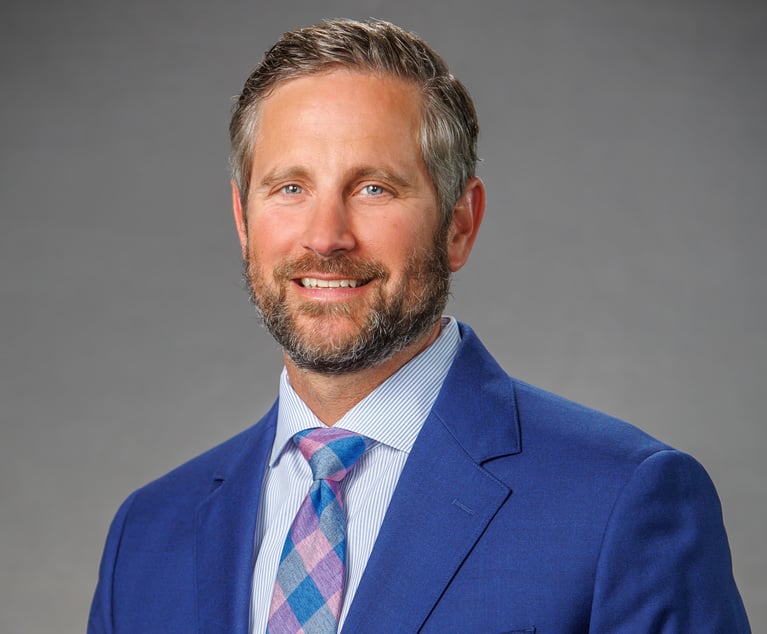ADA Handling Rittenhouse Square Stabbing Case Is Resigning to Join Beasley Firm
Assistant District Attorney Louis Tumolo, who has been at the prosecutor's office since 2012, is resigning to join The Beasley Firm, a prominent Philadelphia personal injury law firm.
August 23, 2018 at 05:47 PM
5 minute read
 Photo: Shutterstock
Photo: Shutterstock
An assistant Philadelphia district attorney who handled some of the city's most recent high-profile cases, including one involving a stabbing in the Rittenhouse neighborhood and another involving a police officer who was fatally shot, is leaving the office.
Assistant District Attorney Louis Tumolo, who has been at the prosecutor's office since 2012, is resigning to join The Beasley Firm, a prominent Philadelphia personal injury law firm.
Tumolo's departure comes as the homicide unit, and the office in general, has undergone significant staffing changes since District Attorney Larry Krasner took over the office in January. Along with significant changes made at the beginning of the year, an assistant supervisor for the office left in June, and The Legal has learned that another assistant supervisor for the unit, long-time prosecutor Ed Cameron, is also set to transfer to the insurance fraud unit.
Several sources with ties to the prosecutor's office said Tumolo's departure came after he had disagreements with his supervisors about how the office handled some of the high-profile cases he had been assigned to.
Tumolo, however, refuted those claims, adding, “That had absolutely no part in my decision to leave the office.”
“I got a great offer from a reputable firm that I couldn't pass up,” Tumolo said. “There are a lot of big cases I'm leaving behind that I'm upset about. But I'm leaving them to colleagues that I'm sure are more than capable of seeing that justice is served.”
Beasley firm leader Jim Beasley Jr. said he was “thrilled” to have Tumolo join the firm.
“We're going to give him a little bit of libel, malpractice, aviation and whatever else comes across his desk,” Beasley said. “He's hungry. He's a good solid guy, and he will fit in well.”
Benjamin Waxman, a spokesman for the DA's office, said in an emailed statement that Tumolo ”is well-respected by DA Krasner, his immediate supervisor, and the rest of us in the office.”
“I've had the opportunity to work with him personally and he's a very talented attorney. We're sorry to lose him but wish him well on this new opportunity,” Waxman said in the statement.
Regarding Cameron's move, Waxman said Cameron had requested to be transferred to the insurance fraud unit months ago, but he had been asked to stay in the homicide unit to help train new ADAs.
“It's the intention of the DA to honor his request for transfer,” Waxman said.
Cameron has been in the office more than 30 years, where he handled several prominent cases, including the prosecution of abortion doctor Kermit Gosnell.
Tumolo has been with the office for six years, and spent the last two-and-a-half years in homicide, where he was also assigned to several high-profile cases—sometimes alongside Cameron.
According to court dockets, Tumolo and Cameron had been assigned to the cases Commonwealth v. Williams and Commonwealth v. Hipps, involving the fatal shooting of Philadelphia Police Sgt. Robert Wilson, and Tumolo was assigned to handle Commonwealth v. White. White involves the fatal stabbing of 37-year-old Sean Schellenger by 21-year-old Michael White. The office received significant media attention on both cases, with critics saying Krasner's office was being lenient with its charges and plea deals.
The most recent controversy involved the White case. According to media reports, White had been delivering food as a bicycle messenger near the intersection of 17th and Chancellor streets when he fatally stabbed Schellenger, a real estate developer. White contended he was acting in self defense, but police alleged that White had stabbed Schellenger in the back. Adding to the controversy is the fact that Schellenger is white and White is black.
During a preliminary hearing earlier this month, the office announced it would not pursue a first-degree murder charge and would instead pursue third-degree murder and manslaughter charges.
Krasner said the decision came after the office reviewed cellphone video of the incident, which he said showed there was no evidence that White intended to kill Schellenger, which is a requirement for a first-degree murder conviction. White's supporters lauded the decision, however, others criticized the office for the move, saying the decision was evidence of a double-standard.
Schellenger's mother also issued a statement saying Krasner “overruled his own prosecutors” in the case, and several sources told The Legal a proffer that was held regarding what charges should have been brought had been conducted by supervisors without Tumolo's input. Sources pointed to that meeting as a source of tension.
Tumolo said he did not conduct the proffer, but he denied any claims that he was barred from providing input.
“Maybe some things are being twisted a little bit,” Tumolo said.
In Williams and Hipps, the office also received significant criticism because Krasner sought a life without parole plea deal, rather than seeking the death penalty. During a tense hearing, in which both Carlton Hipps and Ramone Williams entered deals for life without parole plea, plus 50 to 100 additional years, the victim's family members said they felt “cheated” by the office and that the case was being used for “political gain.”
Krasner, who campaigned on a platform of criminal justice reform and said during his campaign that he would not seek the death penalty, appeared briefly during that hearing and said the deal was similar to deals reached under other administrations and that it would “minimize the re-traumatization” of Wilson's two young children.
This content has been archived. It is available through our partners, LexisNexis® and Bloomberg Law.
To view this content, please continue to their sites.
Not a Lexis Subscriber?
Subscribe Now
Not a Bloomberg Law Subscriber?
Subscribe Now
NOT FOR REPRINT
© 2025 ALM Global, LLC, All Rights Reserved. Request academic re-use from www.copyright.com. All other uses, submit a request to [email protected]. For more information visit Asset & Logo Licensing.
You Might Like
View All
Lawsuit Against Major Food Brands Could Be Sign of Emerging Litigation Over Processed Foods
3 minute read
Kline & Specter and Bosworth Resolve Post-Settlement Fighting Ahead of Courtroom Showdown
6 minute read

'Discordant Dots': Why Phila. Zantac Judge Rejected Bid for His Recusal
3 minute readTrending Stories
- 1'Design of Private Websites' Not a Governmental Task: 8th Circuit Sends Privacy Action Against Health Care Provider to State Court
- 2Cuneo Gilbert & LaDuca Establishes Tennessee Presence With Litigation Partner Charles Barrett
- 3Attorney Retires as Lawmaker, But Is Remaining Plugged In at Barclay Damon
- 4Are Firms and In-House Teams Courting Technological Debt With Ambitious Purchases?
- 5Newsmakers: Vicki D. Blanton to Serve as Dallas Bar Association President
Who Got The Work
J. Brugh Lower of Gibbons has entered an appearance for industrial equipment supplier Devco Corporation in a pending trademark infringement lawsuit. The suit, accusing the defendant of selling knock-off Graco products, was filed Dec. 18 in New Jersey District Court by Rivkin Radler on behalf of Graco Inc. and Graco Minnesota. The case, assigned to U.S. District Judge Zahid N. Quraishi, is 3:24-cv-11294, Graco Inc. et al v. Devco Corporation.
Who Got The Work
Rebecca Maller-Stein and Kent A. Yalowitz of Arnold & Porter Kaye Scholer have entered their appearances for Hanaco Venture Capital and its executives, Lior Prosor and David Frankel, in a pending securities lawsuit. The action, filed on Dec. 24 in New York Southern District Court by Zell, Aron & Co. on behalf of Goldeneye Advisors, accuses the defendants of negligently and fraudulently managing the plaintiff's $1 million investment. The case, assigned to U.S. District Judge Vernon S. Broderick, is 1:24-cv-09918, Goldeneye Advisors, LLC v. Hanaco Venture Capital, Ltd. et al.
Who Got The Work
Attorneys from A&O Shearman has stepped in as defense counsel for Toronto-Dominion Bank and other defendants in a pending securities class action. The suit, filed Dec. 11 in New York Southern District Court by Bleichmar Fonti & Auld, accuses the defendants of concealing the bank's 'pervasive' deficiencies in regards to its compliance with the Bank Secrecy Act and the quality of its anti-money laundering controls. The case, assigned to U.S. District Judge Arun Subramanian, is 1:24-cv-09445, Gonzalez v. The Toronto-Dominion Bank et al.
Who Got The Work
Crown Castle International, a Pennsylvania company providing shared communications infrastructure, has turned to Luke D. Wolf of Gordon Rees Scully Mansukhani to fend off a pending breach-of-contract lawsuit. The court action, filed Nov. 25 in Michigan Eastern District Court by Hooper Hathaway PC on behalf of The Town Residences LLC, accuses Crown Castle of failing to transfer approximately $30,000 in utility payments from T-Mobile in breach of a roof-top lease and assignment agreement. The case, assigned to U.S. District Judge Susan K. Declercq, is 2:24-cv-13131, The Town Residences LLC v. T-Mobile US, Inc. et al.
Who Got The Work
Wilfred P. Coronato and Daniel M. Schwartz of McCarter & English have stepped in as defense counsel to Electrolux Home Products Inc. in a pending product liability lawsuit. The court action, filed Nov. 26 in New York Eastern District Court by Poulos Lopiccolo PC and Nagel Rice LLP on behalf of David Stern, alleges that the defendant's refrigerators’ drawers and shelving repeatedly break and fall apart within months after purchase. The case, assigned to U.S. District Judge Joan M. Azrack, is 2:24-cv-08204, Stern v. Electrolux Home Products, Inc.
Featured Firms
Law Offices of Gary Martin Hays & Associates, P.C.
(470) 294-1674
Law Offices of Mark E. Salomone
(857) 444-6468
Smith & Hassler
(713) 739-1250





